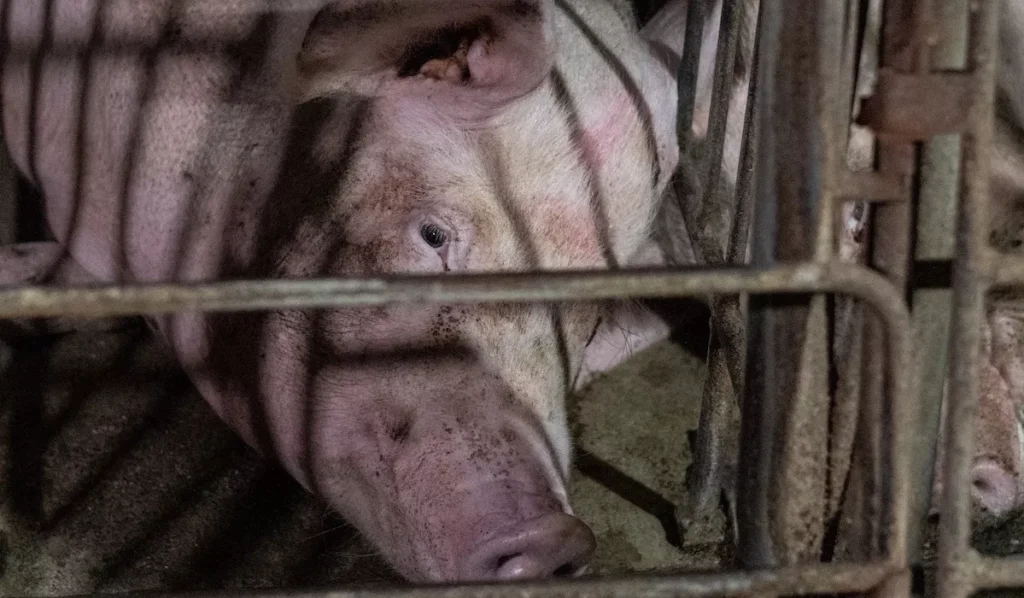Reps. Simon, Costa, and McGovern lead a letter signed by 182 Democrats declaring the SOB Act a threat to family farmers and a welcome mat for foreign-owned factory farms
WASHINGTON, D.C. — In defense of states’ rights, American agricultural sovereignty, and animal welfare, 182 Democrats in the U.S. House sent a letter to House Agriculture Committee Chairman G.T. Thompson, R-Pa., and Ranking Member Angie Craig, D-Minn., urging them to exclude H.R. 4673, the Save Our Bacon (SOB) Act, from any farm bill that may be considered in the 119th Congress. The SOB Act is a reprise of the former EATS Act and the Protect Interstate Commerce Act that were turned back by lawmakers in every Congress dating back nearly 15 years. The full roster of signers can be found here.
In July, 30 Democrats and two Independents in the Senate issued their own letter of opposition to S. 1326, the companion to H.R. 4673.
Reps. Lateefah Simon, D-Calif., and Agriculture Committee members Jim Costa, D-Calif., and Jim McGovern, D-Mass., led the House letter that attracted nearly 90% of all Democrats in the chamber. In September, Reps. Anna Paulina Luna, R-Fla., David Valadao, R-Calif., and Andrew Garbarino, R-N.Y., led the letter cosigned by Michael Bilirakis, R-Fla., Vern Buchanan, R-Fla., Byron Donalds, R-Fla., Brian Fitzpatrick, R-Pa., Carlos Gimenez, R-Fla., Tom Kean, R-N.J., Young Kim, R-Calif., Michael Lawler, R-N.Y., Nancy Mace, R-S.C., Chris Smith, R-N.J., and Jeff Van Drew, R-N.J., sent a similar letter of opposition to agriculture committee leaders.

“We believe that Congress should not usurp the longstanding power of states to regulate food and agricultural products within their borders,” wrote the lawmakers in one of the biggest one-party sign-on letters in the 119th Congress. “We need not agree with every law or rule adopted by each state to adhere to this core principle of federalism. We urge you to reject the inclusion of this provision in any form in any legislative vehicle.”
“The series of letters from Democrats and Republicans against the SOB Act demonstrate that there is overwhelming opposition to the idea of Congress tampering with highly popular farm animal welfare laws,” noted Wayne Pacelle, president of Animal Wellness Action and the Center for a Humane Economy and a key architect of a series of state ballot measures voters that addressed extreme and immobilizing confinement of animals on factory farms. “Animals built to move should be allowed to move, and a small number of lawmakers in the hold of a pork-industry trade association should not override the votes of millions of Americans.
This week, Pacelle wrote an essay describing that the “National Pork Producers Council (NPPC) is seeing massive defections within its ranks on its 15-year campaign to overturn Prop 12 and other state farm animal welfare laws.” He noted that even industrial-scale pork production companies that had been critical of California’s law are producing Prop 12-compliant meat for that market. The Oklahoma-based Seaboard Foods appears on the registry of companies supplying Prop 12-compliant pork and reports increased profits from “higher margins on pork products.” Tyson Foods’ CEO Donnie King acknowledged the company’s ability to supply Prop 12-compliant pork, stating, “we can align suppliers, and we can certainly provide the raw material to service our customers in that way.” Triumph Foods, which has led multiple lawsuits against Prop 12 — and just lost a challenge to Question 3 in Massachusetts in a unanimous ruling of the U.S. Court of Appeals for the First Circuit — maintains active California distribution.
“The SOB Act is a frontal attack on U.S. elections and an invitation for China to expand its unprecedented level of control over domestic pig production,” said Pacelle. “Animal advocates and farmers agree that this policy would be a disaster for food security and animal welfare.”
In May 2023, the U.S. Supreme Court rejected pleadings from the National Pork Producers Council and the American Farm Bureau Federation and upheld Prop 12 as a proper exercise of state authority. With Prop 12 and Question 3 in effect, California and Massachusetts require gestation-crate-free pork amounting to about 6% of total U.S. production. Prop 12 and Question 3 apply just to whole cuts of pork, and not to combined or frozen pork products.
In July, Animal Wellness Action and the Center for a Humane Economy released a science-based report detailing a long set of defects in the so-called “Food Security and Farm Protection Act” (FSFP), S.1326, and Save Our Bacon Act, H.R. 4673. The report, “Rebranded EATS Act Eliminates Nation’s Most Important Farm Animal Welfare Laws,” presents seven core findings undercutting the core arguments of proponents of the EATS Act.
In addition to Representative Simon, McGovern, and Costa, other signers of the are Representatives Adams, Aguilar, Amo, Ansari, Auchincloss, Balint, Barragán, Beatty, Bell, Bennie Thompson, Bera, Beyer, Bishop, Bobby Scott, Bonamici, Boyle, Brown, Brownley, Bynum, Carbajal, Carson, Carter, Casar, Case, Casten, Castor, Castro, Cherfilus-McCormick, “Chuy” Garcia, Chu, Cisneros, Clarke, Cohen, Conaway, Correa, Courtney, Crockett, Crow, Danny Davis, Davids, Dean, DeGette, DeLauro, DelBene, Deluzio, DeSaulnier, Dexter, Dingell, Doggett, Elfreth, Escobar, Espaillat, Evans, Fields, Fletcher, Foushee, Foster, Frankel, Friedman, Frost, Garamendi, Gillen, Goldman, Gomez, Goodlander, Gottheimer, Harder, Hayes, Himes, Holmes-Norton, Horsford, Houlahan, Hoyer, Hoyle, Huffman, Ivey, Jacobs, Jayapal, John Larson, Johnson, Julie Johnson, Kamlager-Dove, Keating, Kelly, Kennedy, Khanna, Krishnamoorthi, Landsman, Larsen, Latimer, Lee, Levin, Lieu, Liccardo, Lofgren, Lynch, Magaziner, Mannion, Matsui, McBath, McBride, McCollum, McGarvey, McIver, Meng, Menendez, Mfume, Mike Thompson, Min, Morelle, Morrison, Moulton, Mullin, Nadler, Neal, Neguse, Nikema Williams, Norma Torres, Norcross, Ocasio-Cortez, Olszewski, Omar, Pallone, Panetta, Pappas, Pelosi, Pat Ryan, Peters, Pettersen, Pingree, Pocan, Pou, Pressley, Quigley, Ramirez, Randall, Raskin, Ritchie Torres, Rivas, Robert Garcia, Ross, Ruiz, Salinas, Sanchez, Scanlon, Schakowsky, Schrier, Schneider, Sewell, Sherrill, Sherman, Smith, Soto, Stevens, Strickland, Subramanyam, Suozzi, Summer Lee, Susie Lee, Swalwell, Sylvia Garcia, Takano, Thanedar, Titus, Tlaib, Tokuda, Tonko, Trahan, Tran, Valazquez, Vargas, Veasey, Walkinshaw, Waters, Watson Coleman, Wasserman Schultz, Whitesides, and Wilson.

